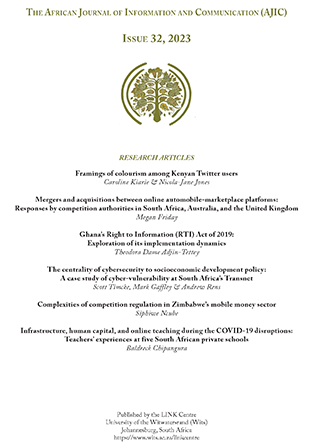Ghana’s Right to Information (RTI) Act of 2019: Exploration of its implementation dynamics
DOI:
https://doi.org/10.23962/ajic.i32.16223Keywords:
right to information (RTI), access to information, public information, media, human rights, civil society organisations (CSOs), principal–agent framework, Ghana, Right to Information (RTI) Act, Right to Information Commission (RTIC)Abstract
After extensive advocacy and lobbying by the media, human rights campaigners, and civil society organisations (CSOs), Ghana’s Right to Information (RTI) Act (Act 989) became law in 2019 and went into effect in January 2020. The Act sets out the procedures for access to information held by Ghanaian public institutions, with oversight by the Right to Information Commission (RTIC). The purpose of this study was to explore the dynamics of initial implementation of the law, in the years 2020-22, and to identify potential obstacles to optimal execution during that initial period. The core research data was collected via semi-structured interviews, between April and August 2022, with 10 individuals possessing deep knowledge of the Act and its implementation dynamics. This interview data was qualitatively analysed, through the lenses of the principal–agent conceptual model and the objectives of the Act, in order to determine the key themes emerging from the data. It was found that realisation of the Act’s objectives was being hampered to some extent by a lack of public awareness, and to a more substantial extent by bureaucratic blockages resulting from a mix of entrenched administrative culture and a lack of knowledge of the requirements of the Act. Based on these findings, the author recommends improved public education by the RTIC in cooperation with CSOs; strong RTIC engagement with public institutions to ensure a sufficient number of fully trained information officers (IOs); continued CSO cooperation with the Ministry of Information towards ensuring optimal implementation of the Act; CSO monitoring of the work of the RTIC; and CSO support for information access applications by journalists and other civil society actors.
References
Abdullah, A. (2021, November 29). Ghanaian journalists still face challenge of access to information despite passage of RTI law. https://jamlab.africa/ghanaian-journalists-still-face-challenge-of-access-to-information-despite-passage-of-rti-law
ACHPR. (2019). Declaration of principles on freedom of expression and access to information in Africa. https://www.chr.up.ac.za/images/researchunits/dgdr/documents/ati/Declaration_of_Principles_on_Freedom_of_Expression_ENG_2019.pdf
Ackerman, J. M., & Sandoval-Ballesteros, I. E. (2006). The global explosion of freedom of information laws. Administrative Law Review, 58(1), 85–130.
Arnott, R., & Stiglitz, J. E. (1986). Moral hazard and optimal commodity taxation. Journal of Public Economics, 29(1), 1–24. https://doi.org/10.1016/0047-2727(86)90023-X DOI: https://doi.org/10.1016/0047-2727(86)90023-X
Bokpe, S. J., & Asante, K. K. (2021, October 11) Testing RTI law: The 33 public institutions that passed or failed. The Fourth Estate. https://thefourthestategh.com/2021/10/11/testing-rti-law-the-33-public-institutions-that-passed-or-failed
Clarkson, G., Jacobsen, T. E., & Batcheller, A. L. (2007). Information asymmetry and information sharing. Government Information Quarterly, 24(4), 827–839. https://doi.org/10.1016/j.giq.2007.08.001 DOI: https://doi.org/10.1016/j.giq.2007.08.001
Cooper, N. (2022,March 29). Ghana: RTI fines KBTH Gh¢30,000 for failure to give information upon request. Ghanaian Times. https://allafrica.com/stories/202203290664.html
Creswell, J. W. (2013). Steps in conducting a scholarly mixed methods study. DBER Speaker Series 48. Discipline-Based Education Research Group (DBER), University of Nebraska-Lincoln. https://digitalcommons.unl.edu/dberspeakers/48
Darbishire, H. (2010). Proactive transparency: The future of the right to information? A review of standards, challenges, and opportunities. World Bank Institute. https://doi.org/10.1596/25031 DOI: https://doi.org/10.1596/25031
Daruwala, M., & Nayak, V. (Eds.). (2008). Our rights, our information: Empowering people to demand rights through knowledge. Commonwealth Human Rights Initiative (CHRI).
Dokeniya, A. (2013). Implementing right to information: Lessons from experience. World Bank. http://hdl.handle.net/10986/16520 DOI: https://doi.org/10.1596/16520
Evans, P. B., & Wurster, T. S. (1997). Strategy and the new economics of information. Harvard Business Review, 75(5), 70–83.
Kumar, R. (2011) Research methodology: A step-by-step guide for beginners (3rd ed.). SAGE.
Lopes, J. (2021). Engagement of CSOs in the collaborative governance of education policy process in Cabo Verde. Cadernos de Estudos Africanos, 41(1), 91–117. https://doi.org/10.4000/cea.6336 DOI: https://doi.org/10.4000/cea.6336
Martini, M. (2014, May 9). Right to information laws: Impact and implementation. U4 Expert Answer. Anti-Corruption Resource Centre. https://www.u4.no/publications/right-to-information-laws-impact-and-implementation.pdf
Media Foundation for West Africa (MFWA). (2021). Essentials of the right to information law (989). https://www.mfwa.org/wp-content/uploads/2021/02/RTI-Toolkit-book-final.pdf
Mendes, J. (2020). The principle of transparency and access to documents in the EU: For what, for whom and of what? University of Luxembourg Law Working Paper No. 2020-004. https://doi.org/10.2139/ssrn.3557795 DOI: https://doi.org/10.2139/ssrn.3557795
Mosquera, M. (2014, February 27). The economics of access to information. Edmond & Lily Safra Center for Ethics blog. Harvard University. https://ethics.harvard.edu/blog/economics-access-information
Neuman, L., & Calland, R. (2007). Making the access to information law work: The challenges of implementation. In The right to know: Transparency for an open world (pp. 179– 213). Columbia University Press. https://doi.org/10.7312/flor14158-006 DOI: https://doi.org/10.7312/flor14158-006
O’Donell, G. A. (1994). Delegative democracy. Journal of Democracy, 5(1), 55–69. https://doi.org/10.1353/jod.1994.0010 DOI: https://doi.org/10.1353/jod.1994.0010
Republic of Ghana. (1962). State Secrets Act, 1962 (Act 101).
Republic of Ghana. (1992). Constitution of the Republic of Ghana, 1992 (as amended to 1996). https://constitutionnet.org/sites/default/files/Ghana%20Constitution.pdf
Republic of Ghana. (2019). Right to Information Act, 2019 (Act 989). https://www.africanplatform.org/fileadmin/user_upload/Ghana-RTI-Act-1_.pdf
Republic of Ghana. (2022). Fees and Charges (Miscellaneous Provisions) Act, 2022 (Act 1080). https://rtic.gov.gh/fees-and-charges-miscellaneous-provisions-act-2022-act-1080
Resnik, D. B. (2008). Environmental health research involving human subjects: Ethical issues. Environmental Health Insights, 2, 27–34. https://doi.org/10.4137/EHI.S892 DOI: https://doi.org/10.4137/EHI.S892
Right to Information Commission (RTIC). (n.d.). About us. https://rtic.gov.gh/about
RTIC. (2021). 2021 Annual report. https://rtic.gov.gh/resource/2021-rti-annual-report
RTIC. (2022). Annual report 2022. https://rtic.gov.gh/reports/2022-annual-report
Schinke, S. P., & Gilchrist, L. (1993). Ethics in research. In R. M. Grinnell (Ed.), Social work research and evaluation (4th ed.) (pp. 80–92). F. E. Peacock.
Shapiro, I. (Ed.). (2003). Two treatises of government and a letter concerning toleration: John Locke. Yale University Press.
Tiwari, A. N., & Ansari M. M. (2018). Transparency audit of disclosures u/s 4 of the Right to Information Act by the public authorities. A Report Submitted to Central Information Commission. Government of India.
Weber, M. (1946). Politics as vocation. In C. W. Mills (Ed.)., Max Weber: Essays in sociology (pp. 77– 128). Oxford University Press.
Downloads
Published
Issue
Section
License
Copyright (c) 2023 Theodora Dame Adjin-Tettey

This work is licensed under a Creative Commons Attribution 4.0 International License.
How to Cite
- Abstract 913
- PDF 516


.png)